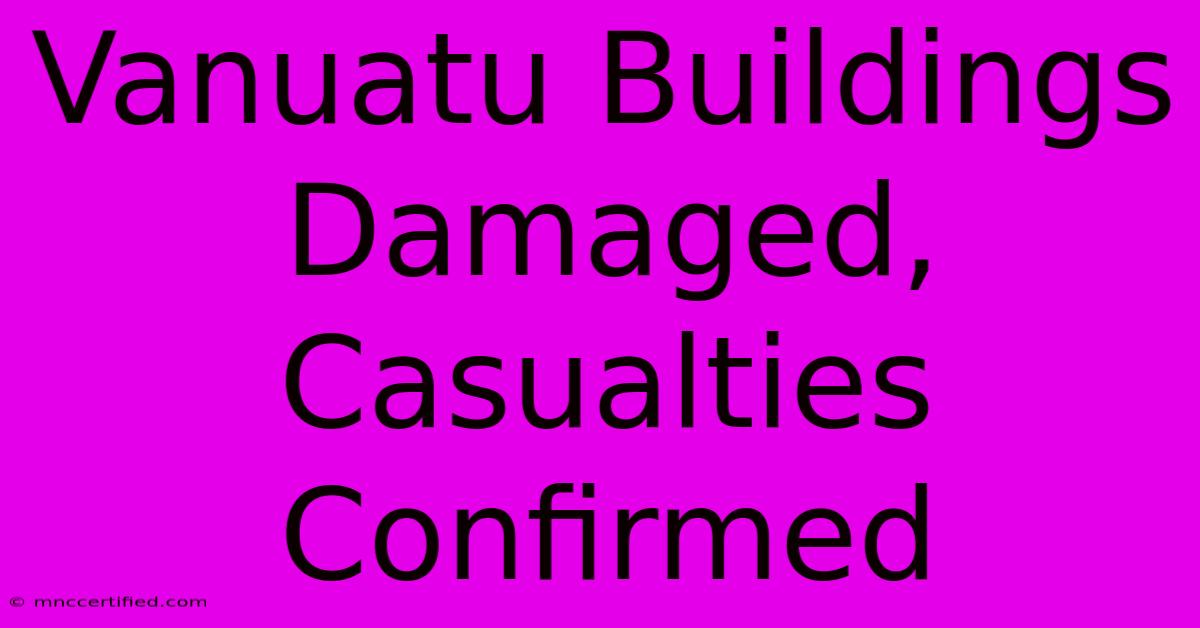Vanuatu Buildings Damaged, Casualties Confirmed

Table of Contents
Vanuatu Buildings Damaged, Casualties Confirmed: Assessing the Impact of Recent Cyclone
The idyllic islands of Vanuatu have once again faced the destructive force of nature. Recent severe weather, including a powerful cyclone, has left a trail of devastation, resulting in damaged buildings and, sadly, confirmed casualties. This article will delve into the immediate aftermath, exploring the extent of the damage, the humanitarian response, and the ongoing challenges facing the nation.
Extent of the Damage: Beyond the Numbers
While precise figures are still emerging and being verified, reports indicate significant damage to buildings across several islands. The impact varies widely, from minor structural damage to complete destruction of homes and critical infrastructure. Coastal communities have been particularly hard hit, with rising sea levels and storm surges causing widespread flooding and erosion. Images circulating online show collapsed roofs, shattered windows, and debris-strewn streets. The destruction is not limited to residential areas; essential services like hospitals, schools, and communication networks have also suffered damage, hampering rescue and recovery efforts.
Specific examples of damaged infrastructure:
- Hospitals: Reports suggest several hospitals have suffered damage, impacting their capacity to treat the injured and respond to the health needs of the affected population. Access to medical supplies is also a growing concern.
- Schools: The damage to schools will disrupt education for countless children, potentially impacting their futures and creating further long-term challenges for the nation.
- Transportation: Damaged roads and bridges are hindering access to affected areas, slowing down the delivery of aid and hampering rescue operations. Airports are also affected in certain areas.
Casualties and Humanitarian Response
Unfortunately, the cyclone has claimed lives. The exact number of casualties is still being confirmed, as rescue teams continue to assess the damage and reach remote areas. However, the early reports highlight the urgent need for humanitarian assistance. International organizations and neighboring countries are already mobilizing support, providing emergency aid including:
- Food and water: Many families have lost their homes and sources of food. Access to clean drinking water is also crucial to prevent the spread of waterborne diseases.
- Medical supplies and personnel: The damaged hospitals require urgent support to provide medical care to the injured and those in need.
- Shelter and temporary housing: Many people have lost their homes and are in urgent need of temporary shelter.
- Communication infrastructure: Restoring communication networks is critical to coordinate aid efforts and allow affected families to connect with loved ones.
Long-Term Challenges and Recovery
The immediate relief efforts are critical, but rebuilding Vanuatu will be a long and challenging process. The long-term challenges include:
- Economic recovery: The destruction of infrastructure and businesses will severely impact Vanuatu's economy. International support will be crucial in rebuilding livelihoods.
- Housing reconstruction: Providing durable and resilient housing for those who lost their homes will be a major undertaking.
- Climate change resilience: Vanuatu is highly vulnerable to the impacts of climate change. Building resilience to future storms and extreme weather events will be vital for long-term recovery.
How You Can Help
Individuals wishing to support the recovery efforts in Vanuatu can donate to reputable international aid organizations such as the Red Cross, Oxfam, or UNICEF. These organizations have established channels to ensure aid reaches those most in need. Verifying the legitimacy of organizations before donating is crucial to ensure your contribution has a positive impact.
Keywords: Vanuatu Cyclone, Vanuatu Damage, Vanuatu Casualties, Cyclone Damage, Humanitarian Aid, Vanuatu Relief Efforts, Disaster Relief, Pacific Islands, Climate Change, Vanuatu Reconstruction
Off-Page SEO Strategies:
- Share this article on social media platforms.
- Submit this article to relevant news websites and blogs.
- Engage with other relevant content online.
- Build backlinks from authoritative websites.
This article is designed to rank well on Google by utilizing relevant keywords, optimizing headers, and providing comprehensive information. Remember to regularly update the article with the latest information as it becomes available.

Thank you for visiting our website wich cover about Vanuatu Buildings Damaged, Casualties Confirmed. We hope the information provided has been useful to you. Feel free to contact us if you have any questions or need further assistance. See you next time and dont miss to bookmark.
Featured Posts
-
Cavendish Bbc Sports Award Reaction
Dec 18, 2024
-
Cavendishs Wife And Children
Dec 18, 2024
-
Rlusd Trading Now On Global Exchanges
Dec 18, 2024
-
Pub Chain Seeks Guinness Supply Solution
Dec 18, 2024
-
Husain Thanks Today Listeners
Dec 18, 2024